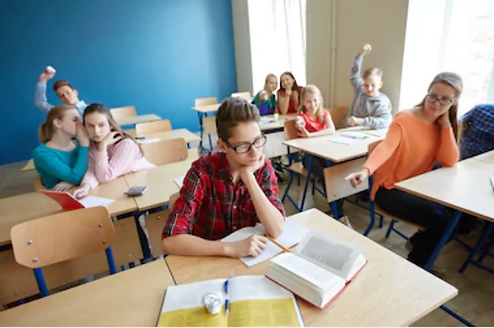BULLYING
Bullying is a form of violence and a way of having power over others. Bullying is verbal, emotional or physical abuse which is repeated and intended to hurt, frighten or threaten someone. Bullying can happen to any child or teenager anywhere, at any time.
Parents can help by listening, believing and supporting children.

Bullying behaviors
Bullying can include:
-
Threatening, teasing, name calling, gossiping and spreading rumours
-
Ignoring or not letting people be part of a group (excluding)
-
Ganging up, playing cruel jokes, preventing others from going where they want, or taking away their belongings
-
Pushing, shoving, hitting or other physical abuse
Bullying can happen anywhere. It happens most where children spend most of their time such as at school or early childhood centres, sport clubs or recreational places.
In families, children can be bullied by parents or siblings, and more recently through cyber bullying.
Cyber Bullying
Technology has increased the ways bullying can take place. Mobile phones, instant messaging, emails, chat rooms or social networking can be used to bully others. Cyber bullying can include repeated teasing, sending nasty or threatening messages, the spreading of damaging information or photos. Cyber bullying can be very scary as it can happen any time of the day or night.
It can feel like there is no getting away from it, not even at home.
Children may not tell their parents as they may be afraid they will be deprived of their phone or other devices.
Parents can help prevent cyber bullying by talking to their children at a young age about what they are doing online, in turn they will be more likely to approach their parents if a problem arises.
Children who are Bullied
-
Bullying is a learned behaviour which means children who bully can learn other ways of dealing with things. Though It’s important not to bully the bully so that children don’t get mixed messages.
-
Children who bully might do it in front of others so they can get recognition. They’re not usually affected by the distress of the victim and are likely to go on hurting others if they’re not stopped. They often don’t do well at school and can have trouble with the law as they get older. As adults they’re more likely to bully their partners, their own children and people at work.
-
Children who are popular, very good at something, smart or attractive can be victims of bullying. However, bullies most often pick on children who seem to be an easy target to hurt. Children who are picked on can often be different in some way such as physical appearance, different culture, shy, younger or lack confidence to stand up for themselves.
What are the Signs & Symptoms of Bullying?
Children may not always tell adults they’re being bullied. They may have been threatened with something worse if they do tell. They may be afraid or ashamed and think it’s all their fault. They might have bruises, torn clothing, damaged or lost personal belongings. They suffer from nightmares, sleep difficulty, bedwetting, loss of confidence and low school performance.
Bullied children learn to be ‘on guard’ all the time, checking where the bully is and wondering when it will happen again. When children are ‘on alert’ like this, they lose the ability to concentrate in school or learn. Their friendships may suffer as they’re often tense, worried and unable to have fun. They may begin to believe they deserve it and become withdrawn, isolated and feel less able to fit into their world. They can even think about suicide.

Children who Witness Bullying
Children who witness bullying may be traumatised by the experience and need support. They may feel powerless to stop someone getting hurt. They need to talk about their feelings and learn what they can do. It’s important for all children to understand that bullying is not OK, even if they’re not involved.
Effects of Bullying
Bullying can make children feel afraid, lonely, embarrassed, angry, upset or physically ill. If it’s not stopped, it can affect the health and wellbeing into adult life. Children who are bullied can have a higher risk of mental health problems such as anxiety, stress, low self-esteem or depression.
What Parents can do
It’s not always easy for a parent to know when and how to step in. The child’s age, maturity and safety all need to be considered.
Listen to your child and take their feelings and fears seriously, avoid calling them names such as ‘weak’. If children are traumatised, they may need professional support.
Cambridge Medical Centre (CMC) Child & Adolescent Mental Health information publications Copyright 2018.
Read more:
The Emotional Cost of bullying: information for parents, carers and anyone who works with young people
© Royal College of Psychiatrists March 2017
